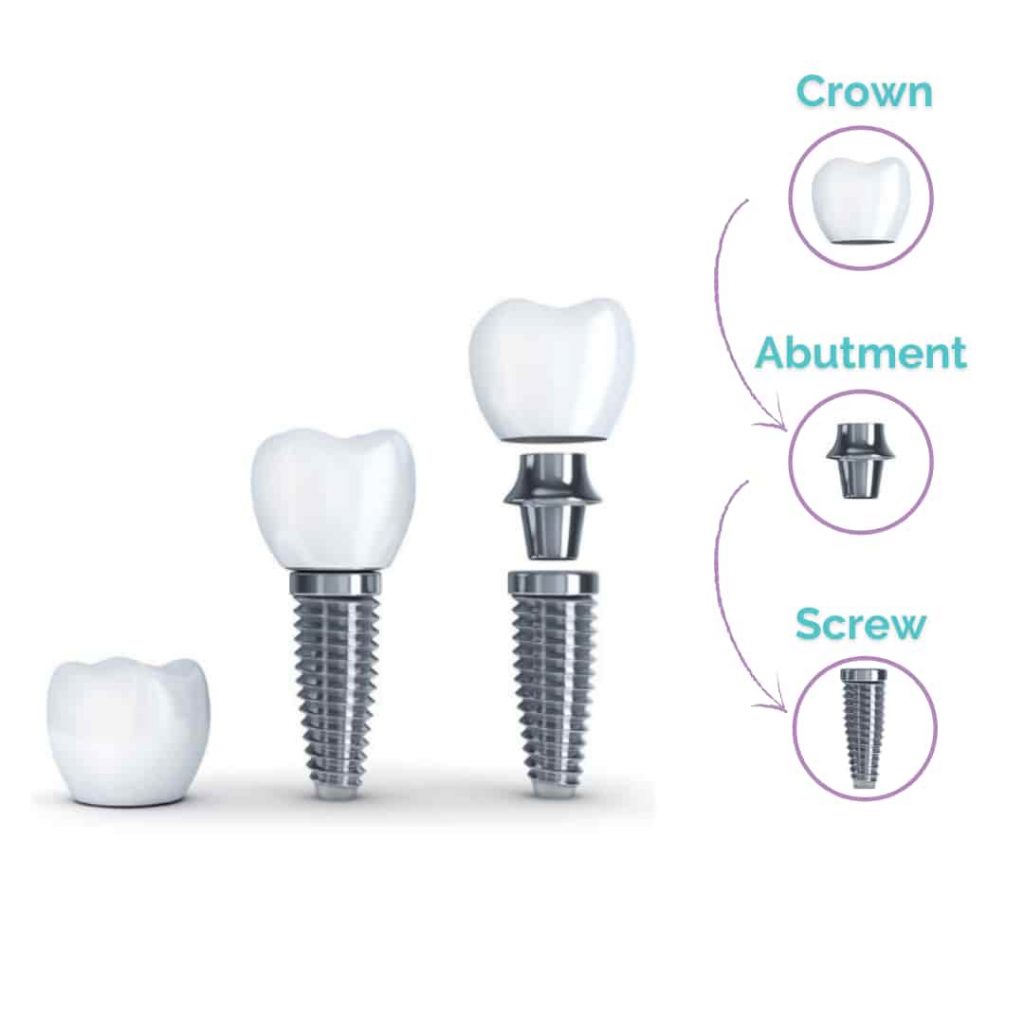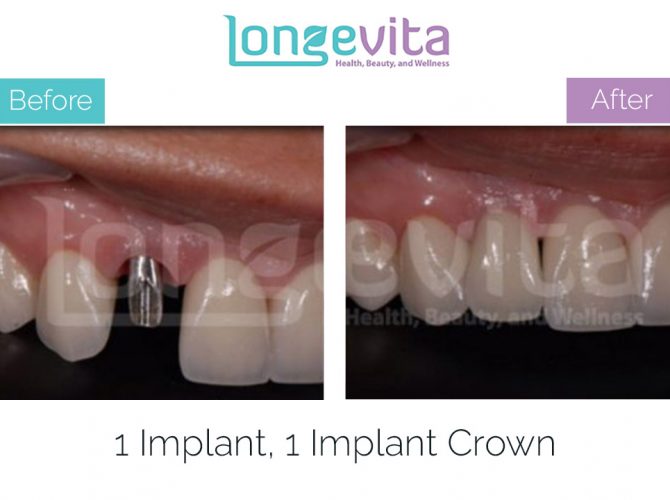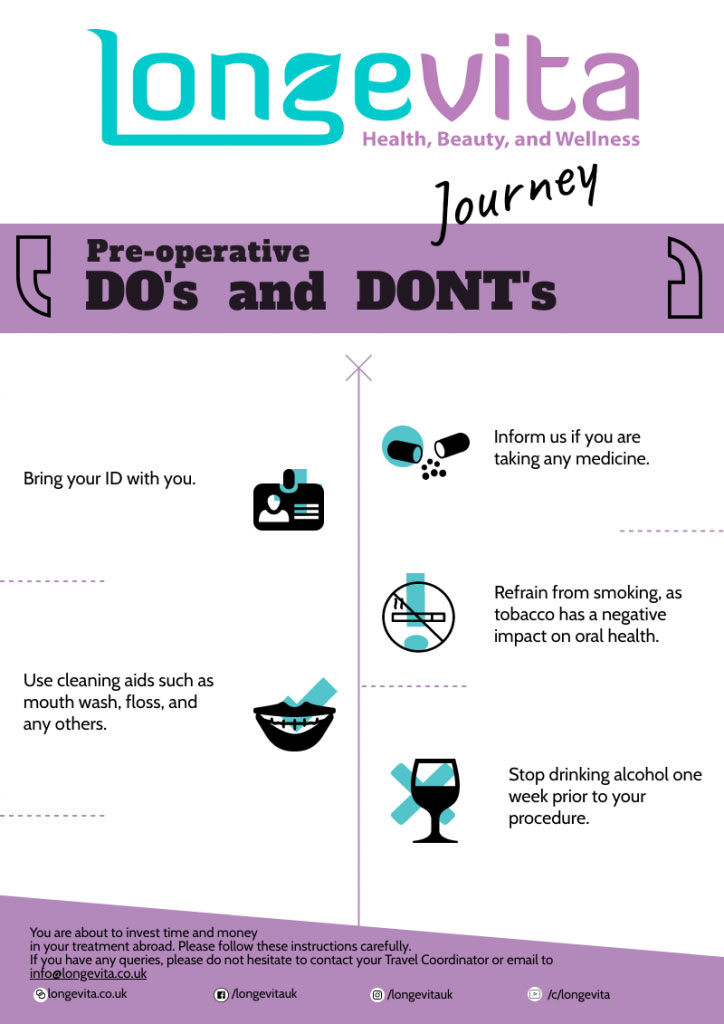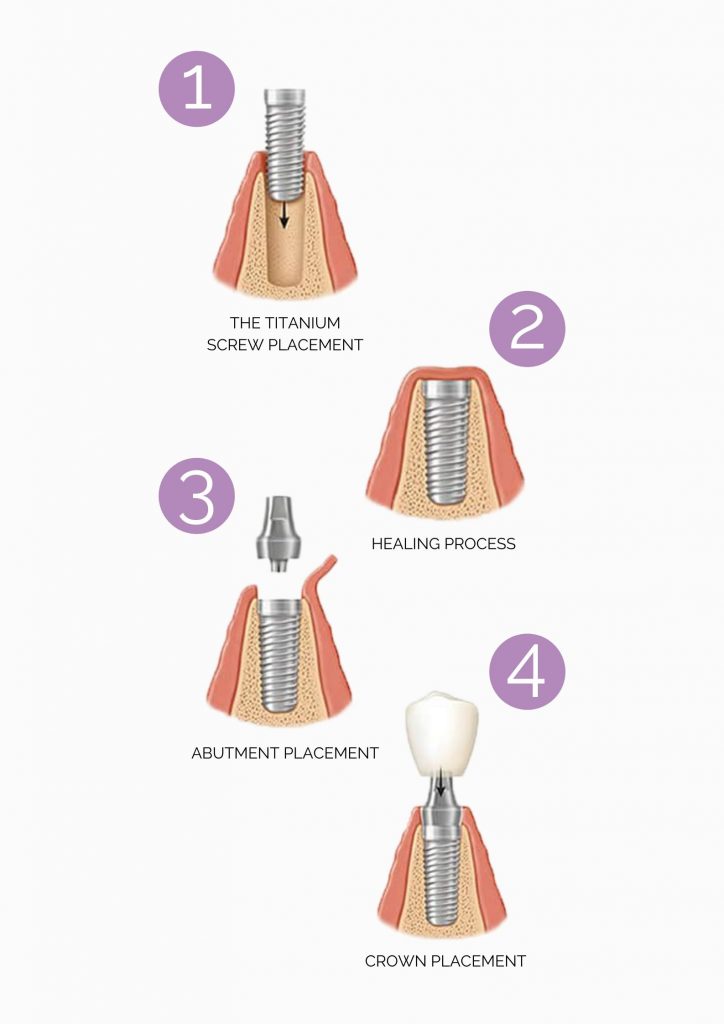Missing teeth can cause functional and aesthetic concerns. Without replacement, it can lead to the degradation of healthy tissue and bone.
A solution to the problem is dental implants, which are artificial teeth root replacements.
These are permanent and made from a biocompatible material, so you can speak and eat like you would with your natural teeth. Have a look at our dental implants before and after gallery.
What Are Dental Implants?
A dental implant constitutes a titanium metal sleeve and an abutment with crowns, fixed dental bridges, or partial/complete dentures on top.
In dental implant procedures, the dental surgeon drills a hole into the jawbone for the placement of the titanium screw. This is what provides stable support for one artificial tooth on top.
It anchors into the jawbone through a process known as osseointegration, in which bone tissue grows around the implant.
This bone fusion process can take 3-6 months. After determining that the implant is secure in the jawbone, the dentist places the abutment and a dental crown on top.

How Much Dental Implants in Turkey?
A single dental implant cost in Turkey is around £500 (~$650).
Turkey’s dental implants’ price is much lower than in other countries.
For instance, the low cost of labour and living in Turkey make dental implants three times cheaper than in the UK.
Dental implants UK cost around £2,500 each, and it’s usually only available privately since the NHS only offers them in certain cases.
Keep in mind that a single dental implant cost in the UK can further vary depending on how experienced your surgeon is. For instance, a London dental implant will be more expensive than a Birmingham one.
Besides the dental implant, you’ll also have to pay separately for the consultation, medications, and follow-ups. So, you can expect the overall dental implants’ price to be around £3,000 or even higher.
Dental implant costs in Turkey can also vary depending on the number of prosthetics (implant and actual tooth) the patient needs. For instance, the cost of full-mouth dental implants is around £4,000 in Turkey.
Here, you should also note that the cost of a dental implant does not include the restorations (dentures or crowns) that will go on top. But even after taking those into consideration dental implants Turkey’s cost is quite affordable.
It’s important to note that the dental implants’ cost can increase if the patient needs additional surgeries like bone grafting, sinus lifting, and/or tooth extraction.
However, even after accounting for these, the cost of dental implants in Turkey is far lower.
Apart from the treatment, companies also offer hotel accommodations, private transfer services, interpreters, and aftercare. Therefore, if you’re looking to save money, you can consider getting dental implants abroad.
Just make sure that you find a good clinic with a Turkish Dental Association-registered dentist. If you’re being quoted dental implants’ costs that are too low compared to the average in the area, there might be a problem with the clinic or the dentist.
Affordable Dental Implants In Turkey For UK Patients
The dental clinics in Turkey offer very affordable dental implants to all the patients coming in from the UK. We at Longevita, offer the best price guarantee, so rest assured, you will get the best possible treatment plan.
Keep in mind that because of the low cost of living and currency exchange rates, Turkey dental implants are more than 50% cheaper than in the UK. And this restoration is not just affordable but also high-quality.
Additionally, if you want, we can set up a flexible payment plan for you.
Who Can Have Dental Implants & Why?
The following people make good candidates for dental implants:
Replacing Removable Dentures: In many cases, people seek dental implants to replace loose or ill-fitting removable dentures. Moreover, it’s inconvenient to have dentures slide when you’re eating or talking.
Many fear they’ll fall out, which can become a cause for embarrassment and discomfort.
Other than that, it can also cause sores, irritation, inflammation, pain and sometimes deterioration of bone health.
So, they want to get dental implants to be able to smile more confidently.
Missing Tooth: This can be a result of trauma, disease, and tooth decay. If you don’t get dental treatments for it, it can result in bite collapse due to tissue and bone atrophy.
It can also change the shape and size of your jaw and face.
A dental implant can stop bone loss and even stimulate the formation of the jawbone.
People who have had complete tooth loss are ideal candidates for full-mouth dental implants in Turkey.
Better Aesthetics: Since dental implants mimic a natural tooth structure and provide a permanent fixture for the artificial tooth, it looks better.
One patient survey showed that almost 85% of patients were satisfied with the implant aesthetics even 10 years after the treatment.
Contraindications For Dental Implants
It is important that the patient should have healthy teeth and be in good health. Implants’ dental surgery may be contraindicated in the following cases:
- Poor oral health
- Heavy smoking
- Cardiac disease
- Cancer
- Immune disorders
Am I Suitable For Dental Implants?
Is It Safe To Have Dental Implants In Turkey?
You can safely get dental implants in Turkey. Well-reputed companies usually use implants from top brands like Straumann, Hiossen, Nobel Biocare, etc. and have registered clinics with dental specialists doing this procedure.
You can also ask the clinic if the implant you’re getting is approved by the Food and Drug Administration (FDA) and has a CE marking on it. Therefore, you don’t have to worry about getting any poor quality or poorly fitted implants.
What To Think About Before You Have Turkey Dental Implants?
When deciding on a clinic for Turkish dental implants, there are a few things that you need to ask so that you can make an informed decision. Make sure to ask the following questions:

- How many times will I have to visit the clinic?
- What kind of procedures does the dentist recommend?
- What are the credentials and experience of the surgeon performing my dental implant procedure?
- What’s the specialization of the surgeon?
- What’s the implant brand the dentist uses?
- What are the overall patient satisfaction rates?
Dental Implant Clinics In Turkey for UK Patients
The dental implant specialists Longevita works with operate in state-of-the-art facilities equipped with the latest technology.
These clinics are also registered with the Turkish Ministry of Health and maintain very high standards for patients’ health and safety.
How To Best Prepare for Teeth Implants?
Before coming in for your implant dental surgery, you may need to make the following preparations:
- After consulting your doctor, discontinue the use of any blood-thinning/anti-inflammatory medication and supplements. Inform the dentist about any medications that you’re taking.
- You need to stop smoking 2 days before the surgery.
- Do not drink alcohol 1 week before getting dental implants as it increases the risk of bleeding.
- Make sure to get a dental checkup with your local dentist. Any gum disease must be treated before the surgery as it can result in bone loss. Your dental health is important.

Dental Implant Procedure

You need to visit the dental clinic at least twice for your dental implant treatment.
Usually, the surgery takes place under local anaesthesia. However, sometimes, IV sedation is also administered. The surgery has two stages:
1st Visit: Once you’ve arrived for your dental treatment, the surgeon will begin by making incisions in the gum to lift the skin flap and drill the jawbone underneath.
The titanium screw is inserted into the socket, and the surgeon will use dissolvable stitches to suture the wound. It may take 3-6 months for the bone to fuse with the implant. The surgery itself takes 1-2 hours.
2nd Visit: The surgeon will cut into the gum tissue to expose the implant. This is done to see if the osseointegration has taken place successfully. The surgeon may also need another X-ray.
A mould will also be taken and sent to the laboratory for the preparation of crown(s) or dental bridge.
If everything’s normal, the surgeon will fit a healing cap into the gum tissue that will jut above the gumline.
This metal post will be fitted for 6-7 days to shape and prepare the gum tissue for the tooth.
Once the tissue is shaped, the surgeon places the abutment on top of the implant and then fits the permanent crowns in the last dental appointment.
Additional Surgeries for Dental Implants
Your dentist can perform additional procedures on you to achieve the best result. To create a treatment plan for you, the oral surgeon will need to examine your mouth.
Also, to get an idea of the health of your gums, teeth, and jawbone, they may need an X-ray or CT scan.
After that, they will decide on the kind of treatment you need. In some cases, the patient needs to have one or more of the following surgeries in order to get mouth implants.
Tooth Extraction
Before placing dental implants, the surgeon may need to extract a tooth.
The tooth may be infected, so the mouth needs to be treated for that before surgery. In this case, you may need to wait for at least a month before getting dental implants.
Bone Grafting
Some patients need to have bone grafts before getting their implants fitted. This is necessary when the patient doesn’t have sufficient bone tissue (or it’s too soft) to provide support to the implants.
This procedure usually takes 1-2 hours. Two different surgical techniques can be required:
Bone graft powder: It uses a powder made from organic or inorganic elements. It is possible for you to get a tooth extraction and bone graft using powder in the same visit.
You may have to wait for at least 1-2 months before getting your implants.
Autografting: In this, the dentist extracts bone tissue from different areas of the mouth for grafting.
Dental implant surgery takes place after the healing of the surgical area. It may take 1-2 months.
Sinus Lifting
To avoid the implant drilling into the sinus, you may need a sinus lift surgery in the upper jaw. This is required if the bone depth is less than 5mm.
You can get a bone graft procedure along with a sinus lift and may need 4-8 weeks to heal. After that, you can get implant surgery.
Dental Implant Success Rate in Turkey For UK Patients
Longevita’s chosen dental implant specialists have a success rate of more than 98%. Therefore, you can rely on them to provide you with the best possible results.
Before the surgery, they’ll check the condition of your jawbone with an X-ray to avoid any complications.
For a safe surgery, they also make sure to thoroughly clean and disinfect all surfaces and instruments. And after the surgery, they’ll do in-person and online follow-ups to ensure complete success.
How Long Do Dental Implants Take In Turkey?
Your first visit to Turkey can take 4-5 days, and the second visit can be around 7-8 days long. Keep in mind that there will be around 3-6 months between each visit.
That’s because after the implant is fitted into the jawbone, you need to wait for it to integrate with it (osseointegration). Only after that’s happened will your dentist place a permanent crown on top of it.
The latter usually takes place in 3 appointments during the same visit and takes a little longer because the crowns are custom-made in a dental lab and have to be checked before being cemented onto the teeth.
Book A Free Consultation With Our Patient Consultants
We offer free consultations for patients, so you can discuss your individual requirements with our specialists. Book A Free Consultation With Our Patient Consultants Today.
Recovery And Result Of Dental Implants
It’s an outpatient procedure, so you can return to your hotel the same day. You can start eating and drinking 2 hours after the procedure.
It’s best if you can rest for 1-2 days after the surgery. Make sure to take painkillers and antibiotics prescribed by the dentist.
The healing period after can differ. It may take at least a week for you to fully recover after this dental treatment.
You can go back to work 5 days after each stage of the dental implant procedure.
However, make sure to discuss this with your surgeon, as it may depend on the nature of your work.
Implants can last for a lifetime. However, you must maintain good oral hygiene. Physical trauma and gum disease can damage the implants.
Dental Implant Aftercare
After the mouth dental implant surgery, you should pay attention to the healing process.
The implant site and surrounding bone require good dental care especially when you have multiple teeth implants.
It’s best to use ice packs to reduce swelling and bruising. Also, it’s best if you eat some cold foods like ice-creams.
You may experience some hot/cold sensitivity temporarily. Make sure that you don’t eat any hard foods like nuts, candies, and apples.
They can hurt the implant site. You should only eat soft foods for a few days after the implant treatment. If you’re using temporary dentures, you should keep them clean all the time.
In addition, you should avoid smoking for a week after the surgery as it can delay healing. Excessive drinking will have the same effect.
Completely avoid alcohol for 5 days after the surgery. If you have a teeth-grinding disorder (bruxism), make sure to wear your mouthguard.
And lastly, practise good oral hygiene by brushing, flossing, and using mouthwash.
Side Effects to Expect After Getting Mouth Implants
You may experience the following side effects after getting dental implants:
- Light bleeding
- Redness
- Swelling
- Pain
- Bruising
- Stiffness/soreness
What Could Go Wrong After Having Dental Implants?
After getting dental implants, you may experience the following problems. They may happen if you don’t follow the aftercare instructions:
- Failure of the jaw bone to fuse the implant.
- Fracture of dental implants.
What To Do If You Have Problems After Getting Dental Implants In Turkey?
If you’re experiencing any problems or feel that your recovery after getting a teeth implant isn’t proceeding normally, you can get in touch with our Aftercare Team.
You can also message us or open a ticket in the Support Portal. Or you can call or email us.
In addition, you can also learn more about the aftercare process in post-operative guides available online.
Dental Implant Reviews in Turkey For UK Patients
Our patient reviews speak for themselves.
From the moment you reach out to us until you fully recover, our team will be right by your side.
You can check out the reviews on our site or independent sites like Trustpilot or even Google reviews.
Alternatives to Dental Implants
There are some instances where the surgeon may recommend alternative treatments to you.
- Dental bridges: If you’re missing one tooth, these will bridge the gaps between the teeth.
- Removable full/partial dentures: They can restore functioning if you’re missing more than a few teeth. You can get them if you prefer having something removable over permanent fixtures.
- Root canal: In case of extensive tooth decay, you can also get a root canal. This will retain the tooth structure and is relatively quicker than getting implants.
Other Procedures to Have with Dental Implants In Istanbul
Apart from getting teeth implants, implant crowns and dentures, you can get other dental treatments for your remaining teeth to complete your smile transformation.
If you’re not getting full mouth implants, you can get zirconium dental crowns or porcelain veneers.
Composite bonding can also take care of minor chips and cracks. You can also add hair transplants and other cosmetic procedures to your treatment plan.
FAQ
Who is the surgeon, and what are their qualifications and experience?
Different surgeons can perform different parts of dental implant treatment. You may have an oral maxillofacial surgeon or a periodontist in the first stage and a prosthodontist in the second stage of the surgery.
Is the clinic registered with a health care authority?
Yes, the clinic in which the teeth implant surgery will take place is registered with the Turkish Ministry of Health.
Does the dental surgeon have insurance that covers dental implant procedures?
Yes, they will have insurance against malpractice.
How many teeth implants can I have?
That depends on the needs of the patient. You may need just one implant to replace one tooth. Or you can get a full set of teeth in the upper and lower jaw through implants.
Can I wear crowns or dentures after getting dental implants?
You have the option of wearing temporary dental crowns or temporary dentures after the placement of the implant. However, you cannot wear these immediately as they can put pressure on the healing gum tissue.
Is it painful to get dental implants?
No, you won’t feel any pain when getting dental implants because of the administration of local anaesthesia.
Reviewed and approved by Dr. Izbel Aksit.